We’ve all been there: your furry friend leans in for a cuddle or a kiss, and you’re greeted by a whiff of, well…less than pleasant breath. While doggie breath might be a common issue many pet owners laugh about, persistent bad breath could be a sign of underlying health concerns. Plus, let’s face it, fresher breath makes those close moments even more enjoyable!
If you’re in search of natural remedies to combat that notorious doggy breath, you’re in the right place. This blog delves into how yogurt, a simple pantry staple, might be the answer to freshening your canine’s breath. And not only will we explore the wonders of yogurt, but we’ll also introduce you to a few other natural remedies that promise to bring a breath of fresh air into your dog’s life. Let’s journey together into the world of canine oral health and discover how a spoonful of yogurt might just be the fresh start your dog needs.

The Culprit Behind Bad Dog Breath
Ah, the infamous doggy breath! While some might shrug it off as a “normal” part of owning a dog, it’s essential to remember that a dog’s breath doesn’t naturally smell foul. In fact, persistent bad breath can often be a telltale sign of underlying issues, much like with us humans.
First and foremost, the most common cause of unpleasant canine breath is a buildup of bacteria in the mouth. Just as we humans accumulate plaque and tartar, dogs too face this dental dilemma. Left unchecked, this buildup can not only produce a rancid aroma but also lead to gum disease and tooth decay.
Another potential offender? A dog’s diet. Sometimes, what your pooch is munching on might be contributing to the issue. Certain foods can get stuck in between teeth, break down, and produce an unwanted odor. Moreover, gastrointestinal issues or a diet that doesn’t agree with their stomach can also be reflected in their breath.
Additionally, various health concerns, from kidney disease to diabetes, can manifest as bad breath. This makes it crucial for pet owners to be vigilant and not simply dismiss bad breath as an “ordinary” dog trait.
In essence, while a fleeting whiff of bad breath post-tuna treat might be expected, chronic bad breath is usually a cry for attention from your pup’s body. By addressing and understanding the root causes, we can find effective, natural solutions, like the potential power of yogurt, to combat and prevent this widespread issue.
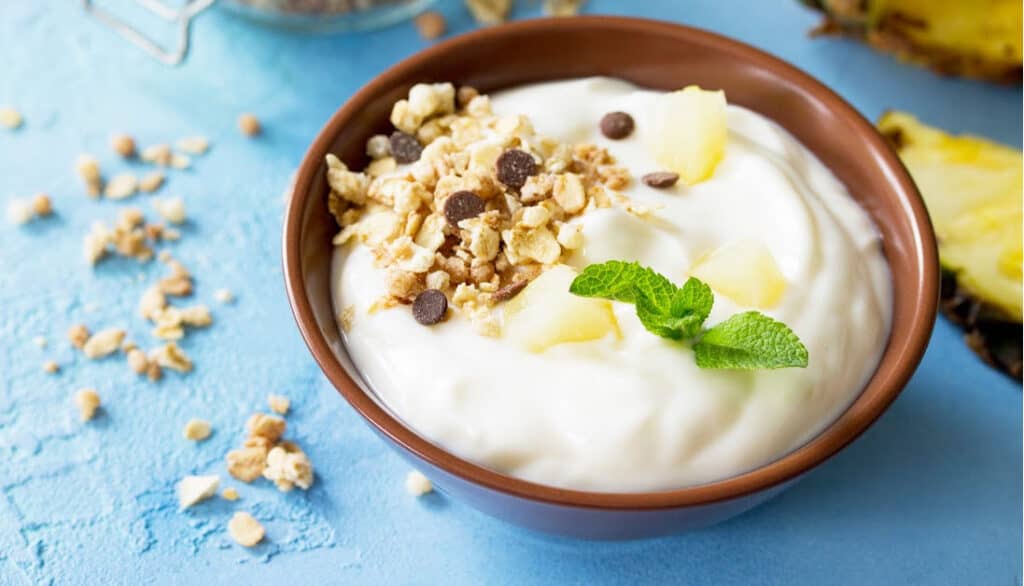
Yogurt: A Natural Breath Freshener
There’s something quite delightful about digging into a creamy bowl of yogurt, especially on a warm day. But did you know that this cool treat could also be a secret weapon against that notorious doggy breath? Let’s dive into the wonderful world of yogurt and discover how it can be a game-changer for your furry friend’s oral health.
How Yogurt Works
Most yogurts are teeming with beneficial bacteria known as probiotics. These little microscopic heroes are fantastic for balancing out the gut flora. But what does the gut have to do with your dog’s breath? A lot, as it turns out! An imbalance in the gut can manifest as various issues, including bad breath. By ensuring a balanced gut microbiome, you’re essentially tackling the problem from the root.
Additionally, the consistency of yogurt can have a gentle cleaning effect, helping to dislodge trapped food particles and bacteria, especially when given as a treat after meals.
Choosing the Right Yogurt
Now, before you dash off to the fridge and scoop out a generous helping of yogurt for your pooch, there are some things to consider. Not all yogurts are created equal, especially when it comes to our four-legged friends.
- Watch Out for Added Sugars: Just as excessive sugars aren’t great for our health, they’re not ideal for our dogs either. Sugars can feed harmful bacteria, leading to dental issues and, you guessed it, bad breath. Always opt for plain, unsweetened yogurt.
- Beware of Artificial Sweeteners: Some yogurts, especially those labeled as ‘low-calorie’ or ‘diet’, might contain artificial sweeteners. One in particular, xylitol, is extremely toxic to dogs and can be life-threatening. Always read the label carefully before sharing any food with your dog.
- Go for Natural and Unflavored: To ensure your dog gets the best, always choose natural, unflavored yogurt. It ensures they’re getting the benefits without any potential harmful additives.
In essence, yogurt isn’t just a tasty treat; it’s a powerhouse of potential benefits that can aid in freshening your dog’s breath. As with any dietary addition, moderation is key, and always observe your dog for any allergic reactions or sensitivities.
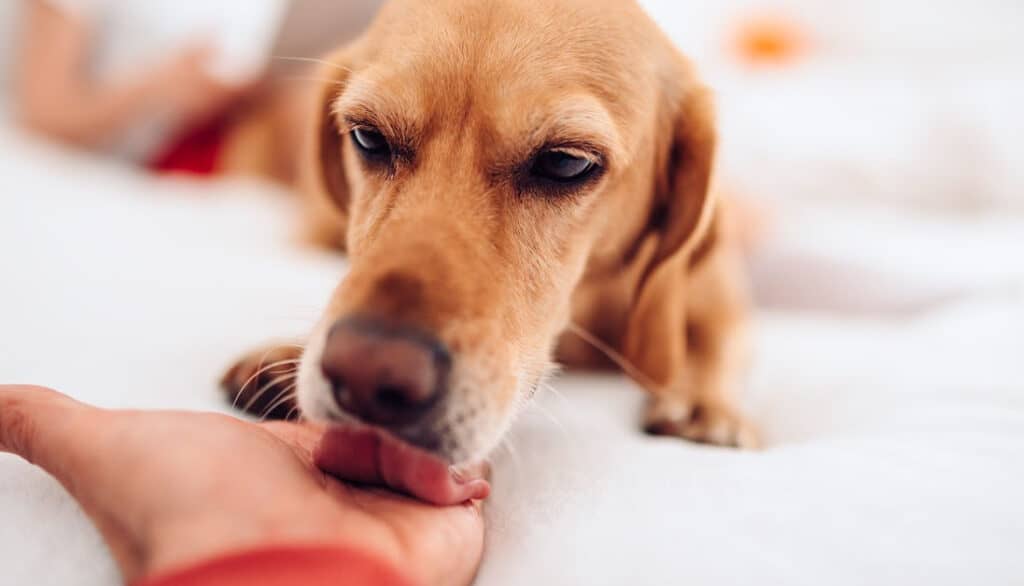
Other Natural Remedies for Bad Breath in Dogs
While yogurt might be stealing the limelight in our quest for fresher doggy breath, it’s far from the only natural remedy out there. Mother Nature has provided us with a bounty of solutions, many of which might be sitting in your kitchen right now! Let’s explore some of these tried-and-true natural alternatives to keep your canine’s kisses fresh and inviting.
Coconut Oil
Oh, the wonders of coconut oil! Dubbed a ‘superfood’ for both humans and pets alike, its benefits are vast. For our purposes, its antimicrobial properties are what make it shine. The lauric acid present in coconut oil can help eliminate harmful bacteria in your dog’s mouth, leading to fresher breath.
How to use: Consider adding a small spoonful to your dog’s food or using it as a toothpaste alternative for a gentle brushing session.

Parsley
Often dismissed as just a garnish, parsley is a potent fresh breath agent. It contains chlorophyll, known for its deodorizing properties, which can neutralize bad odors.
How to use: Finely chop some fresh parsley and sprinkle it over your dog’s food. Alternatively, you can brew a weak parsley tea and add it to their drinking water.
Mint
Mint isn’t just for our mojitos; it’s a refreshing treat for our dogs too! Known for its instant breath-freshening properties, it’s a natural choice for combatting bad odors.
How to use: Ensure you’re using a dog-safe mint variety (like spearmint). You can grow a pot in your garden for your pup to nibble on, or occasionally sprinkle some fresh mint leaves onto their meals.
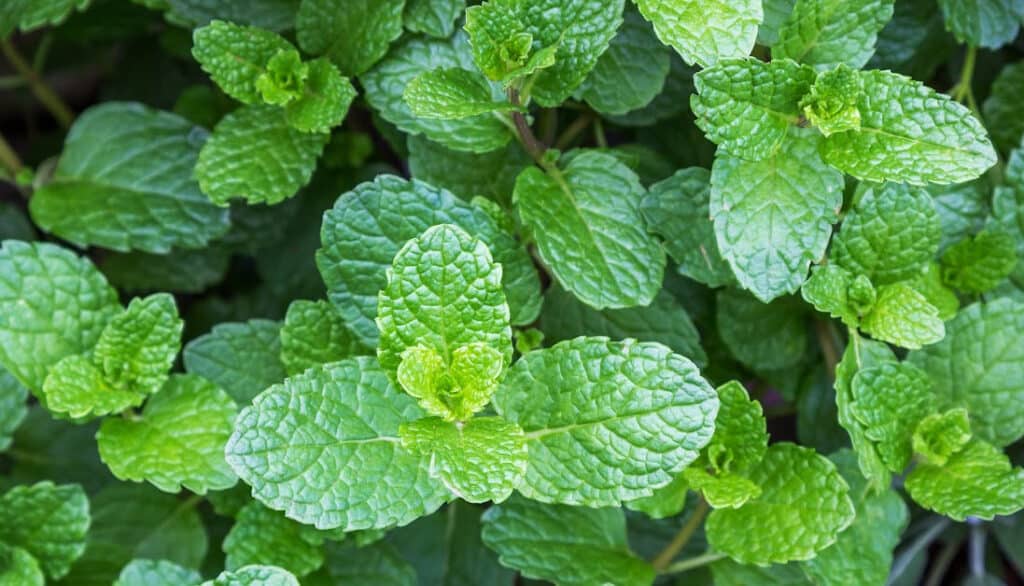
Oral Health Specific Probiotic
Much like yogurt, other probiotics are designed specifically to target oral health. These supplements are crafted to introduce beneficial bacteria that combat the bad bacteria causing foul odors in your dog’s mouth.
How to use: Oral probiotics for dogs usually come in chewable tablet or powder form. Always follow the recommended dosage and consult with your vet before introducing any new supplement.
It’s amazing how many natural solutions are at our fingertips (or, in this case, our dog’s tongue-tip!) when it comes to addressing canine bad breath. Each dog is unique, so it’s worth exploring different options to discover which remedy your pup responds to best. Remember, while these remedies are fantastic, they aren’t a substitute for regular vet check-ups and good oral hygiene practices.

The Importance of Regular Dental Care
When we think of our dogs’ health, we often focus on their diet, exercise, and regular check-ups. But how often do we consider their dental health? Just as our teeth and gums play a crucial role in our overall well-being, so too does our canine companions’ dental health impact their quality of life. Let’s delve into why regular dental care should be high on your list of pet priorities.
1. Prevention is Better than Cure
Regular dental care for dogs isn’t just about preventing bad breath—it’s about warding off potential diseases. Plaque and tartar buildup can lead to periodontal disease, a common ailment in dogs. This condition can be painful and lead to tooth loss. By maintaining a consistent dental care routine, you can prevent such issues from arising or catch them early on.
2. Systemic Health Concerns
Dental problems don’t always stay confined to the mouth. Bacteria from gum disease can enter the bloodstream and affect other organs, including the heart, liver, and kidneys. This connection highlights the importance of oral hygiene in ensuring the overall health of your dog.
3. Discovering Underlying Issues
Regular dental check-ups, whether at home or with a professional, can help spot issues that might not be evident initially. Broken teeth, tumors, or other oral abnormalities can be detected early on, ensuring prompt treatment and better outcomes.
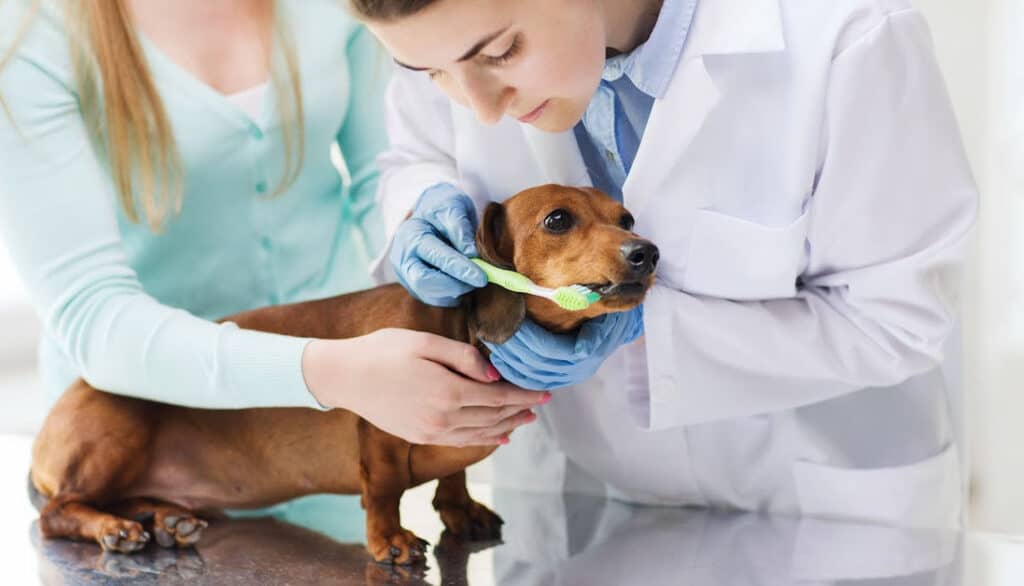
4. Enhancing Quality of Life
A dog with a painful mouth or toothache might not show overt signs of distress. They might eat less, play less, and become more irritable. Ensuring their oral health is in top shape means you’re providing them with a comfortable and pain-free life.
5. Cost Efficiency
Investing in regular dental care, such as toothbrushes, dental treats, and annual check-ups, might seem like an added expense. However, in the long run, it’s far more cost-effective than treating advanced dental diseases or related health complications.
6. Strengthening the Human-Dog Bond
Taking time to brush your dog’s teeth, check their gums, and provide dental treats is not just a health routine; it’s a bonding activity. It shows your dog you care, and it’s an additional opportunity for you to spend quality time together.
In conclusion, while natural remedies like yogurt and parsley are fantastic tools in the battle against bad breath, they should be part of a broader, comprehensive approach to canine oral health. By valuing and prioritizing regular dental care, you’re investing in a happier, healthier life for your beloved four-legged family member.
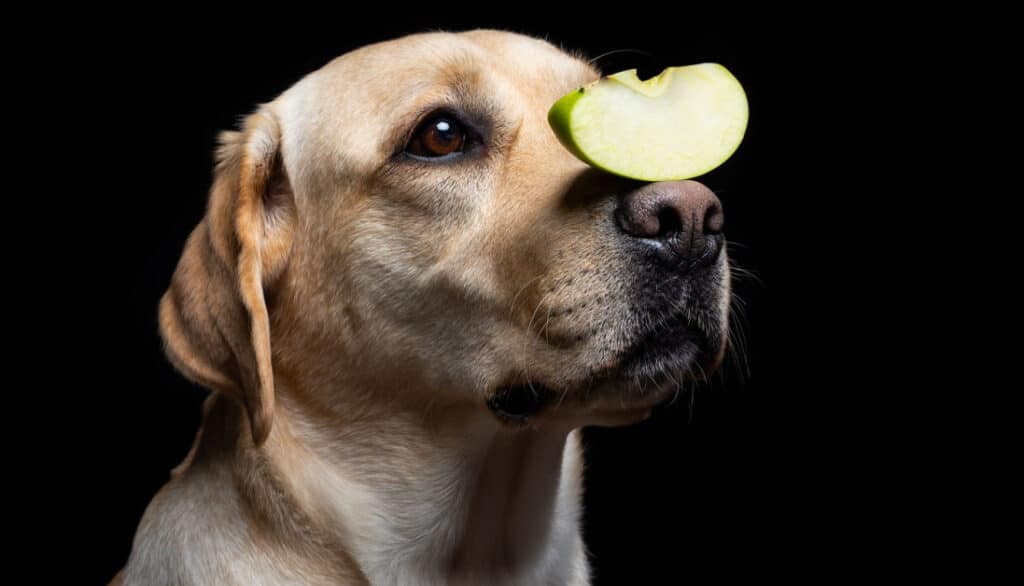
Conclusion
In our journey through the world of canine oral health, we’ve unearthed some delightful and natural solutions, proving once again that nature often holds the best answers. From the creamy wonders of yogurt to the refreshing touch of mint, our kitchens are rife with remedies to ensure our furry friends’ kisses remain fresh and sweet.
But beyond these remedies, the true essence of our exploration is the understanding that our dogs’ well-being goes deeper than just their wagging tails and playful barks. It extends to every tooth, every gum, and indeed, every breath they take. As pet parents, our responsibility is not just to cherish the joyful moments and playful days but to ensure that every facet of their health is attended to, oral hygiene being paramount among them.
Remember, a simple act like checking your dog’s teeth or introducing a spoonful of yogurt can make a world of difference. For in these small gestures, we find the profound love and commitment we share with our pets. Here’s to fresher breath, happier days, and a bond that grows stronger with every nuzzle and lick.
Frequently Asked Questions (FAQs)
No, not all yogurts are suitable for dogs. It’s essential to choose plain, unsweetened yogurt without any artificial sweeteners, especially xylitol, which is toxic to dogs. Always check the label before sharing with your canine companion.
While many of these remedies can be used daily, such as adding coconut oil or yogurt to their meals, it’s essential to start slowly and observe your dog for any adverse reactions. It’s also a good idea to consult with your vet to determine the best frequency and portion size.
Regular brushing of your dog’s teeth with dog-specific toothpaste, offering dental chews and toys designed to reduce plaque, and ensuring yearly vet check-ups for professional dental assessments are crucial steps in maintaining your dog’s oral health.
Yes, if your dog isn’t a fan of yogurt, there are various canine-specific probiotic supplements available. These come in forms such as chews, powders, or tablets. Always consult your vet to choose the right product and dosage for your dog.
While occasional bad breath can be related to the foods they eat or temporary imbalances, persistent or worsening bad breath can be indicative of underlying health problems. If you’ve tried natural remedies and maintain good oral hygiene practices but see no improvement, it’s essential to consult with your veterinarian to rule out more serious health concerns.
